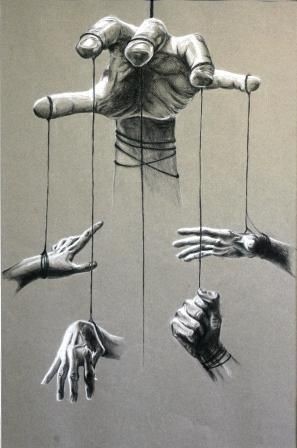
Het seksueel grensoverschrijdend gedrag bij the Voice of Holland (NRC 21 en 22/1/22) heeft in de media voor veel commotie en verontwaardiging gezorgd. De enorme maatschappelijke frustratie, dat het onderwerp al zo lang de aandacht heeft en op de agenda staat van veel organisaties voor uitbannen. Illustratief is het relaas van Karen Emmer in de talkshow Catherine in 2000 (NRC 31/1/22). Kwetsbaar deed zij het verhaal van aanranding en bedreiging tijdens haar werk bij de omroep in Hilversum met als resultaat dat zij aan het kortste eind trok. Zij heeft bij zichzelf achteraf wel de vraag gesteld, waarom zij er geen politiewerk van heeft gemaakt. De kijker hoort haar verdrietige verhaal (en die van haar lotgenoten in de zaal) aan met machteloze woede en tot tranen toe geroerd. Machteloos, omdat alle goedbedoelde adviezen om er toch vooral werk van te maken haar niet verder helpen. De psycholoog in de zaal, Willeke Bezemer, waarschuwde dan ook om die stoere taal niet te bezigen. Maar toch geeft ook zij een advies om de leidinggevende, eventueel de leidinggevende daarboven, de vertrouwenspersoon in te lichten en aangifte te doen bij de politie. Dat zegt John de Mol eigenlijk ook met de toegankelijke ‘loketten’ die er in zijn bedrijf zijn.
The sexually transgressive behavior at the Voice of Holland (NRC 21 and 22/1/22) has caused a lot of commotion and indignation in the media. The enormous social frustration that the subject has been the focus of attention for so long and is on the agenda of many organizations for elimination. The story of Karen Emmer in the talk show Catherine in 2000 (NRC 31/1/22) is illustrative. Vulnerably, she told the story of assault and threats during her work at the broadcaster in Hilversum, with the result that she drew the short straw. Afterwards she did ask herself the question why she didn’t make it police work. The viewer hears her sad story (and that of her fellow sufferers in the room) with impotent anger and moved to tears. Powerless, because all the well-intentioned advice to make it work does not help her any further. The psychologist in the room, Willeke Bezemer, warned not to use that tough language. However, she also advises the manager, possibly the manager above, to inform the confidential counselor and to report the matter to the police. That’s what John de Mol actually says with the accessible ‘counters’ that are available in his company.
Na 22 jaar is dat dus duidelijk het probleem. Ondanks de toegenomen mondigheid, is er een onzichtbare barrière, waardoor dat afweermechanisme niet werkt bij het slachtoffer van seksueel grensoverschrijdend gedrag op de werkvloer. Een soort sluimerende verlamming, die slechts is aan te voelen als je zelf slachtoffer bent. Illustratief voor die barrière is dat slachtoffers bij the Voice onherkenbaar in beeld hun verhaal doen, terwijl Karen Emmer en haar lotgenoten in de show van Catherine Keyl in 2000 kwetsbaar en volledig herkenbaar hun verhaal deden. De barrière is in 22 jaar tijd alleen maar hoger geworden. Verdrietig.
Wat dan te doen om een beetje aan die machteloze situatie het hoofd te bieden?
– Accepteren, dat een afhankelijkheidsrelatie altijd een kiem in zich heeft om uit te groeien tot een onevenwichtige machtsrelatie. Dus in de klas en in het (sport/werk)team, overal waar mensen samenwerken.
– Benoemen van dit risico door de school/het werk/de sportvereniging etc. binnen de groep. Ook als niemand erom vraagt. Dat bijv. het ongevraagd leggen van een hand op een schouder al een grens kan overschrijden. Dat het nooit aan het slachtoffer ligt. Als onderdeel van het kopje integriteit. Aan de hand van echte voorbeelden uit een database moet het risico regelmatig worden besproken. Rollenspellen voor dader en slachtoffer kunnen daar heel goed voor dienen. Tijd moet ervoor worden vrijgemaakt.
– Coördineren door een onafhankelijke vertrouwenspersoon aangesteld door de organisatie. Als vangnet, mocht het slachtoffer de enorme barrière hebben genomen om toch te praten.
Een ABC’tje? Niet, dus.
After 22 years that is clearly the problem. Despite the increased empowerment, there is an invisible barrier, which means that this defense mechanism does not work for the victim of sexually transgressive behavior in the workplace. A kind of dormant paralysis, which can only be felt if you are a victim yourself. Illustrative of this barrier is that victims on the Voice tell their story unrecognizable, while Karen Emmer and her fellow sufferers in Catherine Keyl’s show in 2000 told their story in a vulnerable and completely recognizable way. The barrier has only grown higher in 22 years. Sad.
What then to do to cope a bit with this powerless situation?
Accept that a relationship of dependence always has a seed in it to grow into an unbalanced power relationship. So in the classroom and in the (sports/work) team, wherever people work together.
Mention of this risk by the school/work/sports association etc. within the group. Even if no one asks. That, for example, placing a hand on a shoulder unsolicited can already cross a boundary. That it is never the victim’s fault. As part of the integrity heading. The risk should be discussed regularly using real examples from a database. Role-playing games for perpetrator and victim can serve this purpose very well. Time must be set aside for it.
Coordinating by an independent confidential counselor appointed by the organization. As a safety net, should the victim have crossed the huge barrier to talk anyway.
An ABC? Not, so.
Ricky Turpijn



